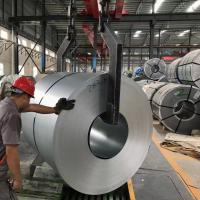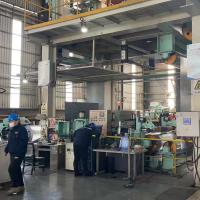9260 Spring Steel Strips Carbon Steel Alloy 9260 / 60Si2Mn
Thickness 0.3 - 3.0mm
Specification of our products
Product Name | Cold rolled steel strip |
Thickness | 0.12-4mm |
Coil Weight | 3-8 ton, or as your requirement |
width | 6-700mm, or as your requirement |
Tolerance | Thickness: +/-0.02mm, Width:+/-2mm |
Material grade | 65MN
S50C, C50, CK50, CK50E, SAE 1050
S75C, C75, CK75, CK75E, SAE1075
S60C, C60, CK60, CK60E, SAE1060
S45C, C45, CK45, CK45E, SAE1045
S55C, C55, CK55, CK55E, SAE1055
SK4, SK5, SK85,51CrV4, 75Cr1
60Si2Mn, 55Si2Mn, 62Si2Mn, SUP 6,etc |
surface | iron gray (low carbon plate), brown (special alloy plate, the high
carbon plate), partial ochre (weather resistance), with temperature
oxidation pattern, than manufacture rough surface |
Standard | ASTM,DIN,JIS,BS,GB/T |
Payment terms | 30% T/T deposit in advance, 70% T/T balance within 5 days after B/L
copy, 100% Irrevocable L/C at sight, 100% Irrevocable L/C
after receive B/L 30-120 days, etc |
Delivery times | Delivered within 7 days after the receipt of deposit |
Package | tied up with steel strips and wrapped with water proof paper |
Application Range | Widely used in ship, automobile, Bridges, buildings, machinery,
pressure vessels and other manufacturing industries |
Advantages | 1. Reasonable price with excellent quality
2. Abundant stock and prompt delivery
3. Rich supply and export experience, sincere service |
Certificates | CE, ISO9001-2008,ETC. |
Physical Properties of 9260 Steel
9260 steel is given its four-digit name by the joint naming index
created by the AISI and SAE. To learn more about this naming
scheme, as well as the differences between steel grades, review our
article on the types of steels.
The first digit designates the class of the steel alloy- that is,
what the major alloying components are (besides carbon). For this
steel, the “9” shows that this steel is of the silicon-manganese
class of alloy steels. The second digit represents the percentage
of these major elements; the “2” in 9260 steel, therefore, means
this class is around 2% silicon/manganese. Finally, the last two
digits represent the carbon percentage in the steel, in increments
of 0.01%. Using this rule, 9260 steel is 0.60% carbon. The exact
chemical composition of 9260 steel is much more specific, (seen
below with tolerances), but its name gives a good idea as to its
general makeup.
The specific elemental percentages of 9260 steel are:
- 0.56- 0.64% Carbon
- 0.75-1.0% Manganese
- <= 0.035% Phosphorus
- 1.8-2.2% Silicon
- <= 0.040% Sulfur
9260 steel can often be found as AISI 9260 steel and is considered
a high-silicon spring alloy steel. This means it has good spring
characteristics and is useful for its flexion as well as its
resilience to deformation. It is easily machined when annealed and
can be welded by all methods except via oxyacetylene torches. It is
generally resistant to corrosion and is hard enough to resist local
surface deformation. It is forgeable as well as heat treatable and
responds well to quench hardening. 9260 steel has a density of 7.85
g/cm3 (0.284 lb/in3) and is most often found in the form of round
bar, plate, tube, and sheet stock. Its optimal spring
characteristics make 9260 steel an exceptional choice when
producing leaf and conical springs but can also be used in many
other areas as a high-strength alloy.
Mechanical Properties
Table 1 (below) shows some important mechanical properties of 9260
steel. This section will go through each property and detail how
they show the strengths – and weaknesses – of 9260 steel.
Table 1: Summary of mechanical properties for 9260 steel.
| Mechanical Properties | Metric Values | English Values |
| Modulus of Elasticity | 200 GPa | 29000 ksi |
| Hardness (Rockwell B) | 94 | 94 |
| Ultimate Tensile Strength | 770-1525 MPa | 112000 – 221200 psi |
| Tensile Yield Strength | 440-1149 MPa | 63800-166600 psi |
| Machinability | 40% | 40% |
Modulus of elasticity or Young’s modulus describes the elastic
resilience of a material. In other words, it describes how elastic
a material is and is a measure of both the stiffness as well as the
general material strength. 9260 steel has an elastic modulus of 200
GPa, which is over twice as much as most aluminum alloys. This
large elastic modulus allows 9260 steel to be more easily machined,
as its stiffness and strength allow for easy milling.
The hardness of a material is measured in many ways; as such, there
are numerous hardness scales created by various testing companies.
One of the most common hardness scales used for steel is the
Rockwell hardness scale, which uses the Rockwell indenter machine
to test materials of similar strength. The Rockwell scale is only
useful if you know how other materials scored on the same scale;
for example, the Rockwell B hardness value for copper is 51, so we
know that 9260 steel (with an HRB of 94) is much harder than
copper. The hardness of material represents its ability to resist
surface deformation and is necessary to understand when
implementing a material in a high-stress environment. 9260 steel
is, therefore, a great choice for these kinds of applications, as
its hardness exceeds other spring steels such as 5160 steel (to
learn more, see our article all about 5160 steel).
The ultimate tensile and tensile yield strengths are common values
provided by experimental stress tests. They each describe the
maximum stress needed to permanently deform (yield) and fracture
(ultimate) a specimen of metal, and these values show the stress
tolerances of a material. These values fluctuate based on heat
treatment and the history of the steel, which is why Table 1 shows
a range of values for 9260 steel. These ranges show the impressive
strength of this alloy steel and show why 9260 steel is so useful
in spring applications. This range also means 9260 steel can be
conditioned to suit any number of applications, as its yield and
ultimate strengths can be modulated to fit the project’s
specifications.
Machinability is a comparative value that describes how a material
performs under machining stresses. It can only be used when in
reference to some baseline material, which is given a score of 100%
machinability. A percentage under 100% is said to be more difficult
to machine than this reference material, but it does not
necessarily mean this material cannot be machined. As seen in Table
1, the machinability score of 9260 steel is 40%, which is in
reference to a 100% score for AISI 1212 steel. While it may
initially seem that 9260 steel is not easily machined, it is easily
machined when softened. The lower score is simply due to its
increased strength, which can wear down machine bits faster and
cause more delays in material processing.
Applications of 9260 Steel
Type 9260 steel is a versatile spring steel; its high strength,
corrosion resistance, hardness, and workability lend it to any
application which favors resilience. It is most commonly used in
leaf and conical springs, but some other notable applications can
be seen below:
- Aircraft parts
- Military technology
- Bridge supports
- Machine tools
- Blades and cutlery
- Railway applications


















